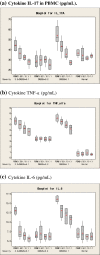The allogeneic umbilical cord mesenchymal stem cells regulate the function of T helper 17 cells from patients with rheumatoid arthritis in an in vitro co-culture system
- PMID: 23237239
- PMCID: PMC3551778
- DOI: 10.1186/1471-2474-13-249
The allogeneic umbilical cord mesenchymal stem cells regulate the function of T helper 17 cells from patients with rheumatoid arthritis in an in vitro co-culture system
Abstract
Background: Previous in vivo studies have shown that mesenchymal stem cell (MSC) transplantation significantly improves the condition of a number of autoimmune diseases including autoimmune cerebrospinal meningitis, multiple sclerosis, glomerulonephritis and systemic lupus erythematosus.
Methods: To investigate the immunoregulatory effect of stem cell transplantation, human umbilical cord MSCs were co-cultured with peripheral blood mononuclear cells (PBMCs) from patients with rheumatoid arthritis (RA). Orphan nuclear receptor gamma (ROR-γ) mRNA and protein expression was detected with real-time PCR and Western blotting. Interleukin (IL)-17, IL-6 and tumor necrosis factor (TNF-α) in the cell culture supernatant were measured using a flow cytometric bead capture method.
Results: After 72 hours of co-culture, the mRNA and protein expression levels of ROR-γ in co-cultured PBMCs were decreased compared with that in PBMC of RA patients cultured alone (p < 0.05). Moreover, the decrement was positively related to the disease activity of RA (p < 0.05). Decreased secretion of IL-17, TNF-α and IL-6 were also found in co-culture supernatants of PBMCs from patients with severe and moderate disease activity, but not in supernatant from PBMCs cultured alone. The decreased cytokine expression levels were positively correlated to the concentrations of MSCs. In contrast, PBMCs from healthy controls or patients with mild RA did not show significant differences in ROR-γ expression or cytokine secretion following co-culture with MSCs as compared with those cultured alone.
Conclusions: In vitro co-culture with MSCs down-regulated the inflammatory response of PBMCs from RA patients with severe disease activity, but had no significant effect on PBMCs from healthy controls or patients with mild disease activity, suggesting that the immunoregulatory role of MSCs may associate with the occurrence of inflammatory mediators.
Figures



Similar articles
-
Bone marrow-derived and synovium-derived mesenchymal cells promote Th17 cell expansion and activation through caspase 1 activation: contribution to the chronicity of rheumatoid arthritis.Arthritis Rheum. 2012 Jul;64(7):2147-57. doi: 10.1002/art.34391. Arthritis Rheum. 2012. PMID: 22275154
-
Human adipose tissue-derived mesenchymal stem cells in rheumatoid arthritis: Regulatory effects on peripheral blood mononuclear cells activation.Int Immunopharmacol. 2017 Jun;47:59-69. doi: 10.1016/j.intimp.2017.03.016. Epub 2017 Mar 30. Int Immunopharmacol. 2017. PMID: 28364628
-
Human Adipose Tissue-Derived Mesenchymal Stem Cells in Parkinson's Disease: Inhibition of T Helper 17 Cell Differentiation and Regulation of Immune Balance Towards a Regulatory T Cell Phenotype.Clin Interv Aging. 2020 Aug 13;15:1383-1391. doi: 10.2147/CIA.S259762. eCollection 2020. Clin Interv Aging. 2020. PMID: 32884248 Free PMC article.
-
A comprehensive review on the role of mesenchymal stromal/stem cells in the management of rheumatoid arthritis.Expert Rev Clin Immunol. 2024 May;20(5):463-484. doi: 10.1080/1744666X.2023.2299729. Epub 2024 Jan 1. Expert Rev Clin Immunol. 2024. PMID: 38163928 Review.
-
Crystallographic landscape provides molecular insights into the modes of action of diverse ROR-γt modulators.Drug Discov Today. 2022 Feb;27(2):652-663. doi: 10.1016/j.drudis.2021.11.022. Epub 2021 Nov 24. Drug Discov Today. 2022. PMID: 34838728 Review.
Cited by
-
Umbilical Cord Mesenchymal Stem Cell Therapy for Regenerative Treatment of Rheumatoid Arthritis: Opportunities and Challenges.Drug Des Devel Ther. 2021 Sep 15;15:3927-3936. doi: 10.2147/DDDT.S323107. eCollection 2021. Drug Des Devel Ther. 2021. PMID: 34584402 Free PMC article. Review.
-
Trained mesenchymal stromal cell-based therapy HXB-319 for treating diffuse alveolar hemorrhage in a pristane-induced murine model.Stem Cells. 2025 Feb 12;43(2):sxae078. doi: 10.1093/stmcls/sxae078. Stem Cells. 2025. PMID: 39560076 Free PMC article.
-
Cell-based therapies for the treatment of rheumatoid arthritis.Immun Inflamm Dis. 2023 Nov;11(11):e1091. doi: 10.1002/iid3.1091. Immun Inflamm Dis. 2023. PMID: 38018576 Free PMC article. Review.
-
Clopidogrel Enhances Mesenchymal Stem Cell Proliferation Following Periodontitis.J Dent Res. 2015 Dec;94(12):1691-7. doi: 10.1177/0022034515598273. Epub 2015 Jul 28. J Dent Res. 2015. PMID: 26220958 Free PMC article.
-
RE: stem cells loaded with multimechanistic oncolytic herpes simplex virus variants for brain tumor therapy.J Natl Cancer Inst. 2014 Dec 2;107(1):368. doi: 10.1093/jnci/dju368. Print 2015 Jan. J Natl Cancer Inst. 2014. PMID: 25473104 Free PMC article. No abstract available.
References
-
- Goekoop-Ruiterman YP, de Vries-Bouwstra JK, Allaart CF, van Zeben D, Kerstens PJ, Hazes JM, Zwinderman AH, Ronday HK, Han KH, Westedt ML. et al.Clinical and radiographic outcomes of four different treatment strategies in patients with early rheumatoid arthritis (the BeSt study): a randomized, controlled trial. Arthritis Rheum. 2005;52(11):3381–3390. doi: 10.1002/art.21405. - DOI - PubMed
Publication types
MeSH terms
Substances
LinkOut - more resources
Full Text Sources
Other Literature Sources
Medical

